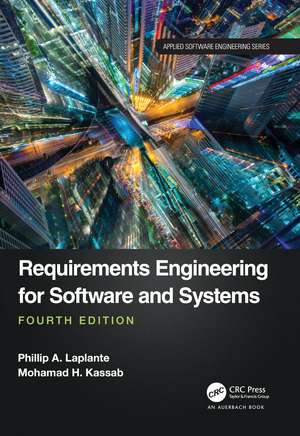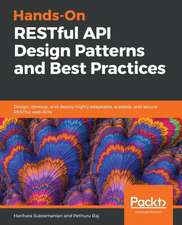Requirements Engineering for Software and Systems: Applied Software Engineering Series
Autor Phillip A. Laplante, Mohamad Kassaben Limba Engleză Paperback – 7 iun 2022
| Toate formatele și edițiile | Preț | Express |
|---|---|---|
| Paperback (1) | 406.83 lei 3-5 săpt. | +59.21 lei 7-13 zile |
| CRC Press – 7 iun 2022 | 406.83 lei 3-5 săpt. | +59.21 lei 7-13 zile |
| Hardback (1) | 1063.28 lei 6-8 săpt. | |
| CRC Press – 7 iun 2022 | 1063.28 lei 6-8 săpt. |
Preț: 406.83 lei
Preț vechi: 508.54 lei
-20% Nou
Puncte Express: 610
Preț estimativ în valută:
77.84€ • 81.28$ • 64.43£
77.84€ • 81.28$ • 64.43£
Carte disponibilă
Livrare economică 15-29 martie
Livrare express 01-07 martie pentru 69.20 lei
Preluare comenzi: 021 569.72.76
Specificații
ISBN-13: 9781032275994
ISBN-10: 1032275995
Pagini: 428
Ilustrații: 129 Line drawings, black and white; 129 Illustrations, black and white
Dimensiuni: 178 x 254 x 28 mm
Greutate: 1.67 kg
Ediția:4 ed
Editura: CRC Press
Colecția Auerbach Publications
Seria Applied Software Engineering Series
ISBN-10: 1032275995
Pagini: 428
Ilustrații: 129 Line drawings, black and white; 129 Illustrations, black and white
Dimensiuni: 178 x 254 x 28 mm
Greutate: 1.67 kg
Ediția:4 ed
Editura: CRC Press
Colecția Auerbach Publications
Seria Applied Software Engineering Series
Notă biografică
Phillip A. Laplante is Professor of Software and Systems Engineering and a member of the graduate faculty at The Pennsylvania State University. His research, teaching and consulting focuses on software quality particularly with respect to requirements, testing, and project management. Before joining Penn State he was a professor and senior academic administrator at other colleges and universities.
From 2010 through 2016 he was the founding chair of the Software Professional Engineer Licensure Committee for the National Council of Examiners of Engineers and Surveyors. This volunteer committee created, maintains and scores the exam used throughout the United States to license Professional Software Engineers.
Dr. Laplante has consulted to Fortune 500 companies, startup ventures, the U.S. Department of Defense, NASA and the National Institute for Standards and Technology (NIST). He is on the Board of Directors for a $100 million heavy infrastructure construction company and serves on various corporate technology advisory boards.
Mohamad Kassab is an associate research professor and a member of the graduate faculty at The Pennsylvania State University. He earned his Ph.D. and M.S. degrees in computer science from Concordia University in Montreal, Canada. Dr. Kassab was an affiliate assistant professor in the department of computer science and software engineering at Concordia University between 2010 and 2012 and a postdoctoral researcher in software engineering at École de Technologie Supérieure (ETS) in Montreal between 2011 and 2012, and a visiting scholar at Carnegie Mellon University (CMU) between 2014 and 2015.
Dr. Kassab has been conducting research projects jointly with the industry to develop formal and quantitative models to support the integration of quality requirements within software and systems development life cycles. The models are being further leveraged with the support of developed architectural frameworks and tools. His research interests also include bridging the gap between software engineering practices and disruptive technologies (e.g., IoT, blockchain). He has published extensively in software engineering books, journals, and conference proceedings. He is also a member of numerous professional societies and program committees, and the organizer of many software engineering workshops and conference sessions.
From 2010 through 2016 he was the founding chair of the Software Professional Engineer Licensure Committee for the National Council of Examiners of Engineers and Surveyors. This volunteer committee created, maintains and scores the exam used throughout the United States to license Professional Software Engineers.
Dr. Laplante has consulted to Fortune 500 companies, startup ventures, the U.S. Department of Defense, NASA and the National Institute for Standards and Technology (NIST). He is on the Board of Directors for a $100 million heavy infrastructure construction company and serves on various corporate technology advisory boards.
Mohamad Kassab is an associate research professor and a member of the graduate faculty at The Pennsylvania State University. He earned his Ph.D. and M.S. degrees in computer science from Concordia University in Montreal, Canada. Dr. Kassab was an affiliate assistant professor in the department of computer science and software engineering at Concordia University between 2010 and 2012 and a postdoctoral researcher in software engineering at École de Technologie Supérieure (ETS) in Montreal between 2011 and 2012, and a visiting scholar at Carnegie Mellon University (CMU) between 2014 and 2015.
Dr. Kassab has been conducting research projects jointly with the industry to develop formal and quantitative models to support the integration of quality requirements within software and systems development life cycles. The models are being further leveraged with the support of developed architectural frameworks and tools. His research interests also include bridging the gap between software engineering practices and disruptive technologies (e.g., IoT, blockchain). He has published extensively in software engineering books, journals, and conference proceedings. He is also a member of numerous professional societies and program committees, and the organizer of many software engineering workshops and conference sessions.
Cuprins
Preface. Acknowledgments. Authors. 1 Introduction to Requirements Engineering. 2 Preparing for Requirements Elicitation. 3 Requirements Elicitation. 4 Writing the Requirements Document. 5 On Nonfunctional Requirements. 6 Requirements Validations and Verifications. 7 Formal Methods. 8 Requirements Specification and Agile Methodologies. 9 Tool Support for Requirements Engineering. 10 Requirements Management. 11 Value Engineering of Requirements. 12 Requirements Engineering: A Road Map to the Future. Appendix A: Software Requirements Specification for a Smart Home. Appendix B: Software Requirements for a Wastewater Pumping Station Wet-Well Control System. Appendix C: Unified Modeling Language (UML). Appendix D: User Stories. Appendix E: Use Cases. Appendix F: IBM DOORS Requirements Management Tool. Glossary. Index.
Descriere
This textbook provides a comprehensive treatment of the theoretical and practical aspects of discovering, analyzing, modeling, validating, testing, and writing requirements for software systems. New chapters examine nonfunctional requirements and requirements of systems using disruptive technologies such as blockchain.












